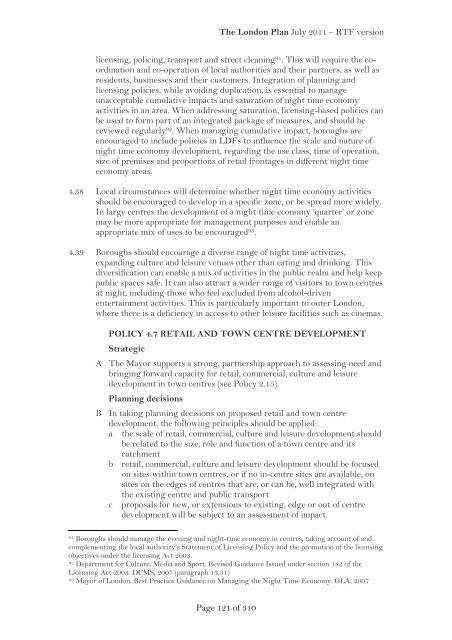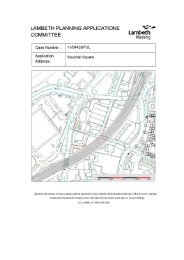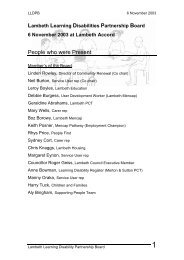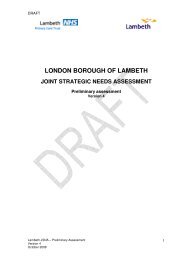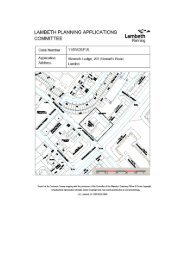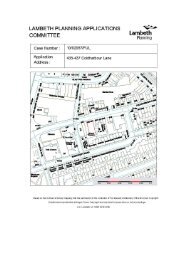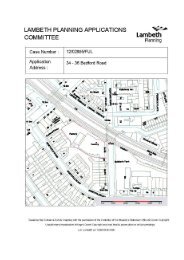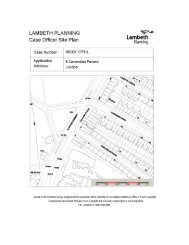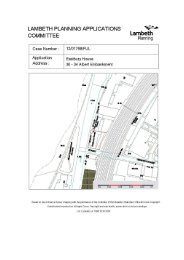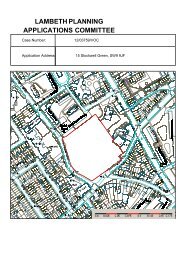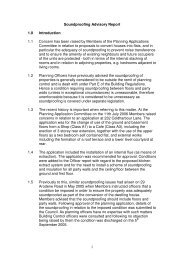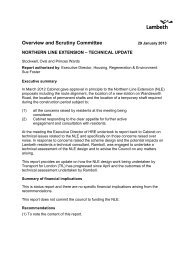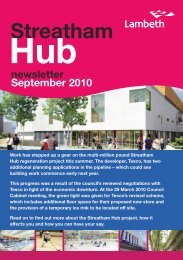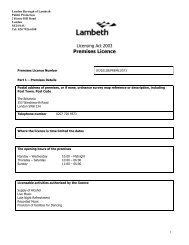London Plan 2011 PDF 1 MB - Lambeth Council
London Plan 2011 PDF 1 MB - Lambeth Council
London Plan 2011 PDF 1 MB - Lambeth Council
You also want an ePaper? Increase the reach of your titles
YUMPU automatically turns print PDFs into web optimized ePapers that Google loves.
The <strong>London</strong> <strong>Plan</strong> July <strong>2011</strong> – RTF version<br />
licensing, policing, transport and street cleaning 91 . This will require the coordination<br />
and co-operation of local authorities and their partners, as well as<br />
residents, businesses and their customers. Integration of planning and<br />
licensing policies, while avoiding duplication, is essential to manage<br />
unacceptable cumulative impacts and saturation of night time economy<br />
activities in an area. When addressing saturation, licensing-based policies can<br />
be used to form part of an integrated package of measures, and should be<br />
reviewed regularly 92 . When managing cumulative impact, boroughs are<br />
encouraged to include policies in LDFs to influence the scale and nature of<br />
night time economy development, regarding the use class, time of operation,<br />
size of premises and proportions of retail frontages in different night time<br />
economy areas.<br />
4.38 Local circumstances will determine whether night time economy activities<br />
should be encouraged to develop in a specific zone, or be spread more widely.<br />
In large centres the development of a night time economy ‘quarter’ or zone<br />
may be more appropriate for management purposes and enable an<br />
appropriate mix of uses to be encouraged 93 .<br />
4.39 Boroughs should encourage a diverse range of night time activities,<br />
expanding culture and leisure venues other than eating and drinking. This<br />
diversification can enable a mix of activities in the public realm and help keep<br />
public spaces safe. It can also attract a wider range of visitors to town centres<br />
at night, including those who feel excluded from alcohol-driven<br />
entertainment activities. This is particularly important to outer <strong>London</strong>,<br />
where there is a deficiency in access to other leisure facilities such as cinemas.<br />
POLICY 4.7 RETAIL AND TOWN CENTRE DEVELOPMENT<br />
Strategic<br />
A The Mayor supports a strong, partnership approach to assessing need and<br />
bringing forward capacity for retail, commercial, culture and leisure<br />
development in town centres (see Policy 2.15).<br />
<strong>Plan</strong>ning decisions<br />
B In taking planning decisions on proposed retail and town centre<br />
development, the following principles should be applied:<br />
a the scale of retail, commercial, culture and leisure development should<br />
be related to the size, role and function of a town centre and its<br />
catchment<br />
b retail, commercial, culture and leisure development should be focused<br />
on sites within town centres, or if no in-centre sites are available, on<br />
sites on the edges of centres that are, or can be, well integrated with<br />
the existing centre and public transport<br />
c proposals for new, or extensions to existing, edge or out of centre<br />
development will be subject to an assessment of impact.<br />
91 Boroughs should manage the evening and night-time economy in centres, taking account of and<br />
complementing the local authority’s Statement of Licensing Policy and the promotion of the licensing<br />
objectives under the licensing Act 2003.<br />
92 Department for Culture, Media and Sport. Revised Guidance Issued under section 182 of the<br />
Licensing Act 2003. DCMS, 2007 (paragraph 13.31)<br />
93 Mayor of <strong>London</strong>. Best Practice Guidance on Managing the Night Time Economy. GLA, 2007<br />
Page 121 of 310


